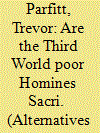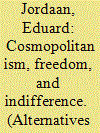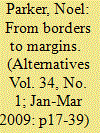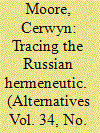| Srl | Item |
| 1 |
ID:
090164


|
|
|
|
|
| Publication |
2009.
|
| Summary/Abstract |
This article examines how the concept of biopolitics is applied in development studies, focusing especially on Giorgio Agamben's account of biopolitics as intrinsic to the analysis of sovereignty and a state of exception. Agamben analyzes sovereignty as a biopolitical enterprise of disciplinary control in which sovereign power is able to enforce its role by the most draconian means while remaining nominally within the law. Agamben further claims that development is a biopolitical enterprise through which the Third World poor are reduced to a situation of bare life. The article interrogates this proposition, questioning how far biopolitics/development must necessarily be conceived as an exercise in oppression.
|
|
|
|
|
|
|
|
|
|
|
|
|
|
|
|
| 2 |
ID:
090166


|
|
|
|
|
| Publication |
2009.
|
| Summary/Abstract |
Despite cosmopolitanism's concern for the world's poor and its concomitant heavy moral demands, cosmopolitans establish a limit to the self's responsibility for the global poor. This contrasts with Emmanuel Levinas's view that the self has an infinite responsibility for the other, a responsibility that derives from the self's questioning of the impact of his freedom on others. From a Levinasian perspective, cosmopolitanism's restriction of the self's responsibility for others creates a sphere of rightful indifference to the needs of the other; lends legitimacy to a disregard of the other; forestalls an ethical awakening to the other; constrains the achievement of a more just global order, given that, from a Levinasian perspective, a better justice is built on the self's open-ended responsibility for the other; and points to a tension at the heart of cosmopolitanism, considering the coexistence of elements that both frustrate and aspire to the achievement of global justice. It is concluded that the achievement of cosmopolitanism's goals would require the acceptance of an open-ended responsibility for the other.
|
|
|
|
|
|
|
|
|
|
|
|
|
|
|
|
| 3 |
ID:
090163


|
|
|
|
|
| Publication |
2009.
|
| Summary/Abstract |
While concepts of a postinternational politics properly highlight the constant variance of entities in play in international relations, the approach lacks an ontology that shows how such an unstable variety of types of players can coexist in a common field in the first place. This article draws upon Deleuze's philosophy to set out an ontology in which the continual reformulation of entities in play in "postinternational" society can be grasped. This entails a strategic shift from speaking about the "borders" between sovereign states to referring instead to the "margins" between a plethora of entities that are ever open to modifications of identity. The concept of the margin possesses a much wider reach than borders, and focuses continual attention on the meetings and interactions between a range of indeterminate entities whose interactions may determine both themselves and the types of entity that are in play.
|
|
|
|
|
|
|
|
|
|
|
|
|
|
|
|
| 4 |
ID:
090165


|
|
|
|
|
| Publication |
2009.
|
| Summary/Abstract |
This article makes a contribution to hermeneutic explorations in global politics. Taking as its points of departure the growing body of work on film and the turn to aesthetic and intertextual IR, the article argues that a further conversation with cinema and poetics can be used to develop the interpretive canon in global politics. In particular, the analysis draws upon the idea of cinematic poetics, and more generally the work of Andrei Tarkovsky, who, throughout his films and written work, articulates a particular form of Russian interpretivism. The article explores Tarkovskian cinema and engages in debates about artistic creativity and aesthetics, filmic representations of belonging and spiritualism, all shaped by a Russian hermeneutic tradition. The final sections apply these themes, illustrating how the icon presents a way to read the themes of suffering and salvation, inscribing the formation of identities in global politics.
|
|
|
|
|
|
|
|
|
|
|
|
|
|
|
|